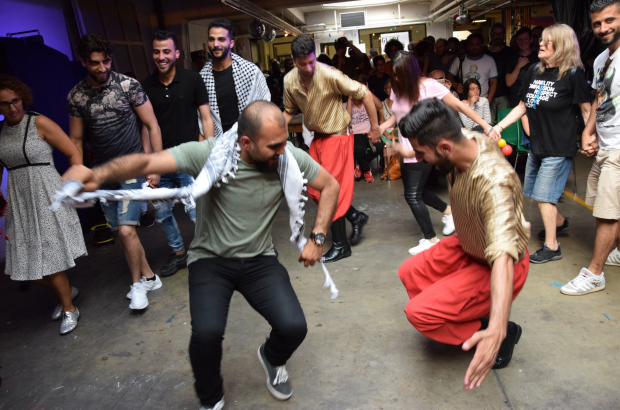- Daily & Weekly newsletters
- Buy & download The Bulletin
- Comment on our articles
Globe Aroma offers artistic newcomers a home away from home
On their journeys from home, refugees must leave most of their belongings behind, but they carry with them their aspirations, skills and established careers. This includes in the arts.
To practise in a completely new environment can be very challenging, which is why Globe Aroma – an open art studio in Brussels – is helping all kinds of newcomers to get in touch both with other artists and their creative selves.
A small alley off Rue Dansaert leads to a garden where a handful of people are taking advantage of the elusive summer sun. Behind the garden lies the building on Rue de la Braie where Globe Aroma found a new home three years ago.
Although it has previously been a textile studio and a furniture workshop, it’s only now living up to its full creative potential. All the nooks and crannies are stacked with artworks in various states of completion. In the back, there’s a rehearsal room for musicians.
The stairs lead to a spacious exhibition room, where the work of a dozen artists is on display. Most of the pieces are paintings, punctuated with an installation and some calligraphy.
Opening doors
Artistic director Els Rochette describes Globe Aroma as an open studio “offering a space where a large variety of art forms find a home”.
The people who come there, she continues, “are mainly refugees and newcomers. Our goal is to offer people who were already involved in art in their former countries – whether on a professional or amateur level – an opportunity to continue their artistic development.”
Practising art in the west can be quite different from other places in the world. “We hope to give newcomers a stepping stone into artistic circles here in Brussels and across Belgium. They can work here, and we try to find ways to show their work to the public.”
Globe Aroma is not the only art project that aims to build bridges with newcomers, but the difference lies in accessibility and an openness towards refugees – no matter what their artistic skills might be.
“We do not impose strict demands on the artistic quality of people’s work,” says Rochette. “We just want to give them the chance to create and to grow.”
The approach also confronts any western assumptions used to define art. “One of our artists, Maher, used to be a well-known calligrapher in Iraq. He was even a teacher at the University of Mosul. Here in the west, calligraphy is not regarded as an art, but more as a handicraft. It is interesting to see how the view on art that newcomers bring with them challenges ours.”
‘A new home’
Joining the conversation is Omid, who was born in Iran but has Afghan roots and found his way to Globe Aroma in 2013 during his stay at the nearby asylum seekers’ reception centre Petit Château.
Omid plays the tabla, an Indian percussion instrument. “We founded a reggae group here and performed on many occasions in Brussels,” he says. “At the moment, my work and my studies have pushed my musical aspirations to the background a bit, but I hope to find time again to play in the future.”
Despite his busy schedule Omid is still active in Globe Aroma as a volunteer, which he says is a way for him to do something for the organisation that helped him find his way in a new country. “I know from my own experience how difficult it is to integrate. My first months in Belgium were hard. I stayed in Petit Château and felt lost because I didn't know anyone. At Globe Aroma, I found a new home. Here you are treated based on your value as a human being, not according to your legal status.”
Not only does the organisation offer a workspace and exposure to newcomers, it reaches out to art enthusiasts among the refugee community. “Every month we organise 10 cultural activities for people who are currently staying at Petit Château,” says Rochette. “We noticed that artists who are active at Globe Aroma seldom visit exhibitions or the theatre, even though Brussels has a lot to offer. So we decided to bridge that gap.”
Newcomers are also encouraged to participate in the decision-making process at the organisation, she says, adding that it’s a way for them to help shape what the project does. “In essence, Globe Aroma wants to relate to newcomers as humans, not solely as refugees. People have a lot more to offer, and we want to give them the chance to do so. That way, we hope to help them to feel at home in a strange, new country.”









